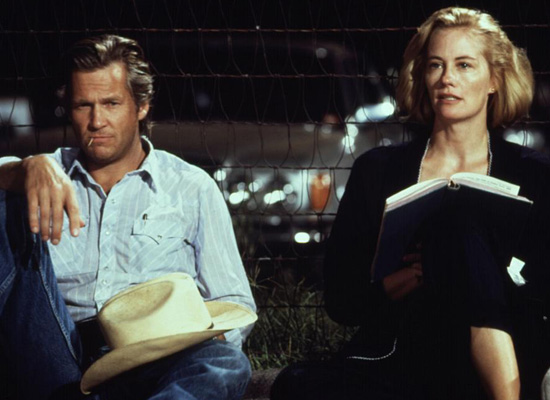Texasville
I wonder how 1990's TEXASVILLE will play for someone who has not seen THE LAST PICTURE SHOW. Possibly like some tedious, terminal soap opera. Larry McMurtry's characters wearily traverse their small Texas town and bed hop as naturally as they breathe and drink. In the original film, the relationships among the residents of Anarene were poignant and had some spark of life. TEXASVILLE rejoins them three decades later. They might've been a bit melancholy before; now they're beaten down, broke, and still no better regarding fidelity.
Duane (Jeff Bridges) was captain of the football team in 1952. He and his friend Sonny (Timothy Bottoms) competed for the same girl, Jacy (Cybill Shepherd), neither ultimately the victor. Duane went to Korea but returned to Anarene and got rich with oil wells. Sonny stuck around and bid the years running the local market. Somewhere along the way his mind began to fail him. Jacy went off to Europe and acted in some low budget films. She began a family but recently lost her son. She returns to town a much wiser soul, not seeking to rekindle any affairs but rather to take stock of her life.
Jacy befriends Duane's wife Karla (Annie Potts), who has long resigned herself to Duane's wandering eye. Karla and Duane had some kids, one of whom is named Dickie (William McNamara) and shares his father's skills in getting the local ladies into bed. He even gets one pregnant - the wife of a local businessman named Marlow (Dennis Quaid), to whom Duane is in hock for twelve million due to plummeting oil barrel prices. Jacy and Karla share notes on Duane, forming a bond that may even threaten Duane's family stability (not that it wasn't fragile to begin with).
As with LAST PICTURE SHOW, the plot sounds like any ol' cheap trashy paperback. There is so much cheating in TEXASVILLE you may well give yourself a headache trying to connect the dots. At times, it becomes comical, rendering investment in the characters (and what happens to them) near moot. The earlier film was stunning and beautiful. The damage these characters did to each other was never celebrated for carnal joy or otherwise. TEXASVILLE seems blase in the face of so much sleeping around. Director Peter Bogdonovich returns to direct and adapt McMurtry's novel and has created a shapeless, rambling movie that just sorta plays and ends.
Is this film amoral? It feels that way at times. But we always see Duane's frustration, inertia, sometimes pain. He's damned tired. He has sex with many women 'cause it's something to do, 'cause he can. Well, most of the time. Early in the film he threatens to shoot his penis off "because it doesn't work half the time anyway." Karla, patient but caustically realistic, still loves him and is perhaps waiting for that moment of Realization for her husband. Potts is very appealing and believable in this role. Bridges does fine work too and Shepherd, whose career has been erratic, gives a nice take on middle aged recognition and associated wisdom. She underplays what could've been a more flamboyant part and leaves off her makeup to look more weathered.
Other characters from LAST PICTURE SHOW return: Ruth Popper (Cloris Leachman) is now Duane's secretary/bookkeeper, forever dispensing advice and far more energetic than she was in earlier times. Eileen Brennan is back as Genevieve, the waitress in Sam the Lion's old cafe who once consoled young Sonny with a free hamburger. Neither character is really given a sufficient update. Ruth has a few fleeting recollections of her affair with Sonny - such a vital relationship in the earlier movie - but I was craving more. Especially as Sonny himself is now living in an apartment connected to her house.
Sonny is representative of the sad state of Anarene itself moreso than anyone else. He's reduced to sitting and watching the sky, slowly losing his neurology. It's a sad sight to see. So is the town. So is the movie?
Not entirely. TEXASVILLE is a bit long in tooth, frequently quite silly, and aimless but is nonetheless fascinating. Most characters are drawn well enough to be vital, and the relational dynamics, while often frivolous, will keep you wondering what will happen next. This film is not the poetry of the original, not by a long shot, but is still an effective portrait of damaged people trying to make sense of their lives, how cruel advancing years may be. Cycles are not easily broken.



Comments